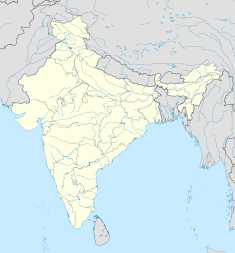This article needs additional citations for verification. (September 2021) |
| Gulab Bari | |
|---|---|
 Gulab Bari, the tomb of Nawab Nawab Shuja-ud-Daula. | |
| Location | Faizabad, Ayodhya district, Uttar Pradesh, India |
| Architectural style(s) | Nawabi |
Gulab Bari (lit. 'Garden of Roses') is the Tomb of Nawab Shuja-ud-Daula, located in Faizabad, Ayodhya district of Uttar Pradesh, India. This place has a good collection of roses of various varieties set by the sides of water fountains. Gulab Bari is the maqbara (Mausoleum) of Nawab Shuja-ud-Daula, the third Nawab of Oudh (now Faizabad) in the campus.[1][2] The monument has declared to be of National Importance under the Ancient Monuments and Archaeological Sites and Remains Act 1958 as updated by the Ancient Monuments and Archaeological Sites and Remains (Amendment and Validation) Act, 2010. Further under Sub-section 20 (a) and 20 (b) of Ancient Monuments and Archaeological Monuments and Remains (Amendment and Validation) Act, 2010.
Gulab Bari is surrounded by an enclosure wall, built of Lakhauri bricks lime plastered and decorated with plaster mouldings. The enclosure contains the tomb of Shuja-ud-daula along with mosque Imambara, Shahi Hammam, Baradari and a well approached through triple-arched gateways. The tomb of Shuja-ud-daula (1753–1775) was constructed by himself during his lifetime which is approached through an imposing gateway. The central chamber contains the cenotaph which houses the graves of Nawab Shuja-ud-daula and his mother. The tomb proper stands in the centre of a Charbagh Garden accompanied by fountains and shallow water channels. The square double-storeyed structure of the mausoleum has an arched verandah on each side, while its upper storey has a three arched façade adorned by minarets on the corners. The dome of the central chamber is crowned by inverted lotus and metal finial.
Gulab Bari is not only a spot that needs to be visited; it is a place of worship and various cultural events. The locals treat it as a holy place. It is said that the monument is connected to a boali in Lucknow and used to be hiding place for the successors of the Nawab Shuja-ud-daula. The fragrance of roses in the Gulab Udyaan brought relief to the busy mind of the nawab and allowed him to work and take decisions. It might have served as soldier's cabin and a house for the servants (not the main monument but the structures around). Today Gulab Bari is though in a poor condition, it still is very important for the locals (mostly of the Muslim Community). It remained very important, remains important and will remain important only if its tourism is boosted and the people become a little more conscious about its importance.
- ^ "Environmental Information System Uttar Pradesh". Directorate of Environment U.P. Archived from the original on 21 December 2011.
- ^ "Welcome to Faizabad History". official website of Faizabad district. Archived from the original on 25 July 2017. Retrieved 10 December 2011.
